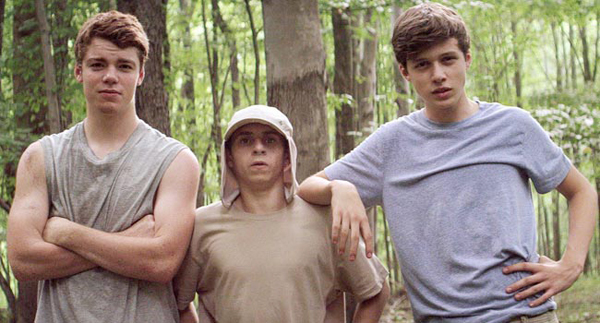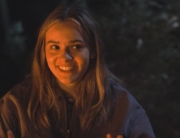The Kings of Summer open with a series of very funny melodramatic flourishes that fit into a teen’s mind-set like a hand into a glove: teenager Joe (Nick Robinson) is berated by his dad (Nick Offerman, excellent as always) for taking too long masturbating in the shower; the construction of a shoddy birdhouse for a shop class is given the heft and momentousness of the parting of the Red Sea. With these moments, director Jordan Vogt-Roberts quickly and effectively constructs a world tailor-made to fulfill teenagers’ expectations of its lameness, which is a good thing if you’re a teenager. For the rest of us, it makes for a series of chronically funny episodes that elicit loud laughter but fade quickly in the memory afterwards.
The youngsters and oldsters who populate this film seem more like figments of cinematic imagination than flesh-and-blood people. With regards to the kids, there are exactly two types of personalities: weirdo and bro, with the latter further subdivided into various stages of budding bro, pre-bro (like Joe), and fully-fledged bro. Robinson’s Bieberish locks and fledgling mustache (the film revels in the details of adolescent facial hair) herald a future frat boy.
Joe’s best friend Patrick (Gabriel Basso, gamely tramping around in a foot cast in a schtick that never quite pays off) is a more sensitive variant on the same type, and their similarity is accentuated by the age-old pursuit of fighting for the same girl, a trope that’s feels so thoroughly lifted from the playbook of budding masculinity that it’s just about flaccid. And in case you need any further clarification as to where these two boys stand with relation to each other, an accidental episode where Patrick’s father (Marc Evan Jackson, dry and very funny along with his on-screen wife Megan Mullally) mistakes a friendly ab checkout for some more serious hanky-panky is hilarious precisely because there is never any chance of it being more.
The weirdo personality category is taken up wholly and gloriously by Moises Arias as Biaggio, who doesn’t so much steal his scenes as masticate them, spit them out, and then chew them up again. His strangeness is played to the uneasy hilt, evincing hints of androgyny and sexual ambiguity that are regarded with queasy humor by his squarely masculine compatriots. Arias plays the part like he was born to it, and he’s both the movie’s strongest asset and a disruptive presence in the otherwise predictable proceedings. He’s good enough that it’s hard to imagine him and his diminutive but sinewy frame in any other role, and he provides the film with its greatest moments of not just comedy but pathos. These latter are affecting enough that Vogt-Roberts cuts quickly away from them, seemingly for fear of the stranger movie that might emerge. (The audience at my screening reacted audibly to his moments of heroism and sympathy.)
But as it is, everything happens pretty much on time and as expected. Once the trio has run away to live independently, they settle into a woodsy preadolescence made easier by their proximity to Boston Chicken while their parents fret over their whereabouts. Alison Brie, as Joe’s older, level-headed sister—and seemingly the one character who has it all together—offers some sage advice to her father, finding some soul and feeling in an underwritten part. Her boyfriend is an amusing goober and clueless enough that you never quite get why he and the sister are together, one of the many instances where depth is sacrificed in favor of schtick. This tradeoff mostly works, because by the time your laughter has subsided, the movie’s basically over, but the preponderance of one-liners begins to feel a little tiresome in the third act, accentuated by the snappy editing that underscores every joke.
The whole thing functions as eminently enjoyable, almost as an accidental insight into traditional fantasies of American boyhood. It’s a narrative so thoroughly embedded in the popular psyche that its resurrection here feels more nostalgic than timely, despite the trappings of modern life (cell phones). When the energy subsides and the predictable lessons are learned, it’s with such ease and lightheartedness that you suspect the happy homecoming had been planned from the get-go, which of course, it had. Everything’s back to normal but nothing’s really changed, except for the fleeting vision of a handmade house in the woods, at once an impossible achievement and a wistful, ramshackle fantasy.







Leave A Comment